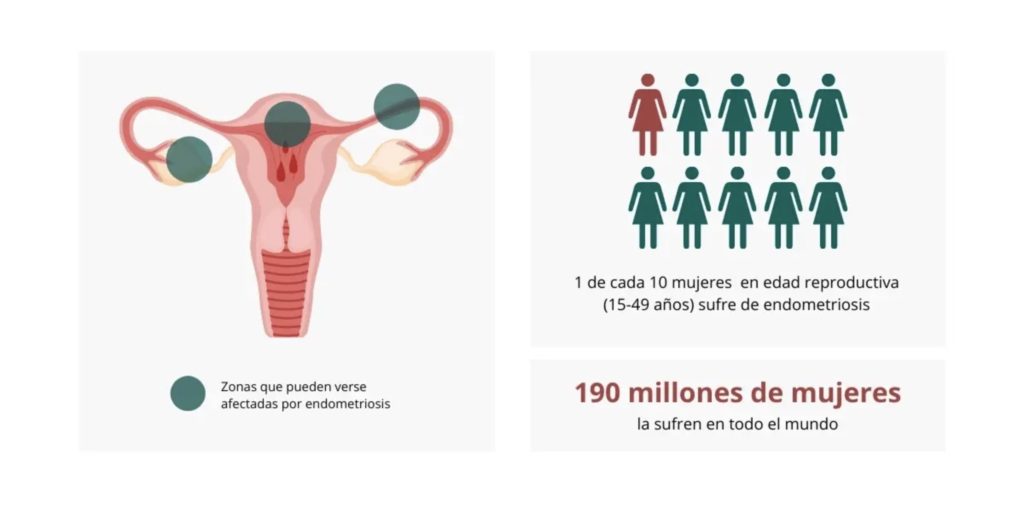- About us
- Assisted Reproduction
Prices and financing
Other specialties
- What is your case?
- Contact
Endometriosis is a chronic disease that affects women. It can cause pain in the lower abdomen and difficulty in getting pregnant.
Endometriosis occurs when cells similar to those of the endometrium, which lines the uterine cavity, grow outside the uterus and develop in other organs. This tissue can rupture and cause bleeding, most commonly affecting the ovaries, fallopian tubes and intestines. Endometriosis can develop in the front, back and sides of the uterus.

Endometriosis can lead to alterations in the reproductive function and impair fertility. It is the cause of infertility in 25 % of our patients.
The mechanisms by which endometriosis causes infertility are controversial and depend partly on the degree of disease involvement.
Some women with endometriosis have no symptoms but most experience pain in the lower abdomen under the following circumstances:
Other symptoms of endometriosis may include
Although these symptoms can be caused by conditions other than endometriosis, it is essential to inform the Assisted Reproduction specialist of their existence.
Endometriosis can be treated in various ways. The right treatment for each woman depends on her symptoms and whether she wants to get pregnant in the future.
The medications used to treat it are:
There is no test for endometriosis but its presence can be suspected by symptoms and through a physical examination. In some cases, imaging tests (ultrasound or MRI) may be useful.
The only way to know for sure if you have endometriosis is to surgically remove endometrial tissue and analyse it.
Endometriosis is a chronic benign hormone-dependent (oestrogen) disease. It is associated with a slight increase in the risk of some types of ovarian cancer. This risk is significantly reduced by treatment with contraceptives. No screening test is recommended because the incidence is very low and no effective test exists.
In cases of deep endometriosis, several organs may be affected, such as the intestines, the urinary tract, etc. This can lead to various symptoms, such as pelvic pain, pain when urinating, etc. Surgery for endometriosis can be complex in these cases and, therefore, the risk of complications is higher. If the endometriosis is very severe, it can affect neighbouring organs and cause serious renal and intestinal problems.
The diagnosis of endometriosis is suspected by the patient’s symptoms (chronic pelvic pain, pain with menstruation, urinary or bowel symptoms, difficulty getting pregnant) or by a physical examination. In some cases, it may be useful to perform an imaging test (ultrasound, MRI). The only way to know for sure if you have endometriosis is to perform surgery, remove endometrial tissue and analyse it.
Endometriosis may be due to a genetic predisposition. In 2021, it was published that women carrying a variant in the NPSR1 gene are very likely to develop endometriosis. Therefore, it is a common disease in women of the same family. However, it may also be due to so-called retrograde menstruation. This is when the uterus contracts to eliminate the menstrual flow and fragments of the endometrium move upwards through the openings of the tubes and nest in the tubes, the peritoneum (inside the abdomen) or the ovaries. Both causes are possible.
Surgery should be considered when chronic pelvic pain does not improve with medical treatment, when there are large endometriomas and when there are endometriotic implants that compromise the proper functioning of other organs, such as the intestines, urinary bladder, etc. Sometimes surgery is performed to improve the reproductive prognosis.
The consequences of surgery depend largely on the pelvic structures affected and the stage of the disease. Chronic pain may persist, genitourinary and intestinal injuries secondary to surgery may occur and abdominal adhesions may develop (certain tissues or organs stick to each other).
Unfortunately, endometriosis cannot be prevented. However, treatment with contraceptives or hormones that interrupt the menstrual period can slow down the progression and alleviate symptoms of the disease. Furthermore, we know that women with endometriosis who become pregnant significantly improve clinically.
The most significant advance in recent years is that surgery for endometriosis has become increasingly less recommended. This helps to preserve the ovarian function and fertility of patients with endometriosis, given that surgery significantly affects ovarian reserve.
There is still a long way to go to understand this disease and, therefore, to improve its treatment and prognosis.
At Institut Marquès we have all Assisted Reproduction treatments in which we use the most advanced technology.
We finance all your Assisted Reproduction treatments. Calculate it yourself with our new financing calculator.
We are different from other centers: restless professionals who constantly seek improvement and excellence.
Rellena el formulario y nos pondremos en contacto contigo para organizar una visita con un especialista en Reproducción Asistida.


Institut Marquès, clínica LGTBI Friendly